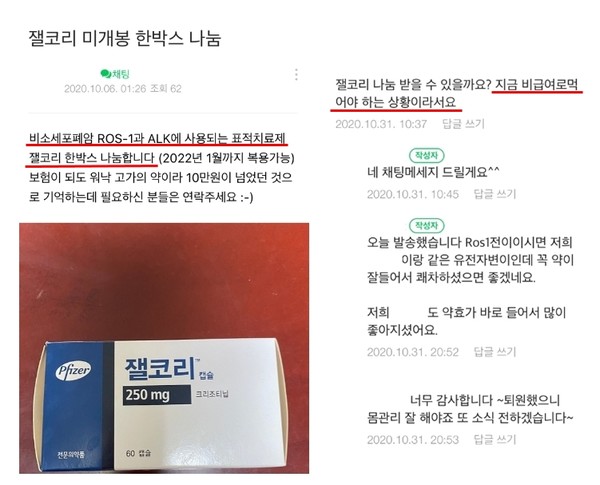
“I’m sharing these for free. Does anyone need Lomustin or Natulan (brain cancer treatment)?”
“I’m selling a monthly dose of Extandi (prostate cancer drug).”
Some online communities for cancer patients recently uploaded such postings where cancer patients gave out leftover orphan drugs and anticancer treatments to other patients for free or sold them.
“I need both Lomustin and Natulan. I’m in the third stage of the six-stage treatment, and I have to apply for an orphan drug next Friday. As I am a recipient of basic income, I rarely pay for visits to hospitals and pharmacies. But the orphan drug is not covered by health insurance, and it is quite expensive. I still have a long way to get anticancer treatment. Please help me get the drugs.”
These comments followed the earlier posting about the free sharing of brain tumor treatments Lomustin and Natulan in August. The writer also added comments to other postings about Lomustin and Natulan.
Lomustine and Natulan are orphan drugs supplied by the Korea Orphan & Essential Drug Center (KOEDC). For patients with rare and intractable diseases, KOEDC imports drugs not distributed in Korea and directly supplies them.
Another cancer patient community had an article offering to share Pfizer’s lung cancer treatment Xalkori.
“I am sharing one box of targeted therapy Xalkori for patients with ROS-1 and ALK non-small cell lung cancer (available until January 2022). Even if it was reimbursable, the drug was quite expensive, and I paid over 100,000 won for this. Please contact me if you need it.”
In the cancer patient community, people sold Astellas’ prostate cancer drug Extandi, Pfizer’s breast cancer therapy Ibrance, Bayer’s liver cancer drug Nexavar, and AstraZeneca’s lung cancer drug Tagrisso.
Free sharing of anticancer drugs could be poisonous
Trading and sharing of prescription drugs are illegal. In particular, anticancer drugs’ adverse reactions are not uncommon. The trading of such medicines between individuals could fail side effect management and lead to drug misuse.
An expert said the free sharing of such drugs, based on goodwill, could harm patients more.
Professor Kim Tae-min of hematology and oncology at the Seoul National University Hospital said he once had a similar case among his patients. He warned the patient that the sharing of the drug was a crime. “It is a pity that this seems to be happening due to the desperate need of patients and guardians,” Kim said.
However, an overdose of Lomustine causes severe bone marrow toxicity. It is dangerous to take Natulan without a prescription because Natulan can cause toxicity while interacting with other drugs and foods, he warned.
Professor Kim Hong-soo of internal medicine at Soonchunhyang University Hospital Cheonan said taking Nexavar could cause cerebral hemorrhage in rare cases. Still, it would be difficult for patients to respond to unpredicted side effects.
When he prescribes Nexavar at the university hospital, he explains the risk several times to patients and informs the danger sufficiently, he added.
‘Fighting cancer means concerns about money’
Some patients were aware that it was illegal to trade anticancer drugs within cancer patient communities, and they worried about side effects.
One patient uploaded a posting to assert that patients should not share prescription drugs and drew considerable support from others.
“I understand the desire to give out unnecessary medicines to those who need them,” the writer said. “But prescription drugs must not be shared because they are allowed only after a doctor sees a patient. Patients should return leftover drugs to the nearest pharmacy or public health center.”
However, other patients said it was inevitable to share or sell anticancer drugs that usually cost up to scores of millions of won.
When a patient said he or she could sell 210 tablets of Nexavar for 100,000 won, which would have been sold at 2 million won initially, another patient said in a comment that such selling of the drug was illegal.
However, a third patient refuted the comment, saying, “If you want to treat cancer, you have to solve financial problems.”
“Selling the non-reimbursable drug at this low price is almost sharing for free,” the patient said, supporting the seller.
‘Free drug sharing is hope for financially troubled patients’
Some patients supported the selling or sharing of anticancer drugs because the drugs were too expensive.
Yoon Gu-hyeon, head of a liver cancer patient group, said the sharing or selling of drugs stemmed from too many non-reimbursable drugs.
He said some cancer patients have to sell their houses to purchase highly-priced drugs, and they had no choice but to get the medications at low prices. “There is a risk of side effects, but this could be the only hope for patients who have to stop treatment because they have no money,” he added.
The Ministry of Food and Drug Safety said the trading of anticancer drugs among patients was illegal. Those who take medications without proper procedures will find it almost impossible to get legitimate relief from damage.
Manufacturers of the anticancer drugs being shared among patients said they were not aware of such trading.
Pfizer Korea and Bayer Korea said, respectively, “We were not aware of the drug distribution in some cancer patient communities.”
An official at Astellas Pharma Korea also said he did not know about the drug sharing.
“It is not something I can comment. We need to confirm it internally,” the official said.

